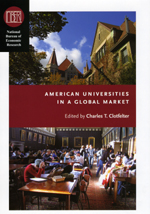The United States’s changing role in the “higher education ecosystem”

For much of the last century American universities have held their place as global leaders in higher education, but recently, with the United State’s economic dominance increasingly jeopardized by rising world powers such as China, and to a lesser extent India, there have been some quiet grumblings about a possible “reverse brain drain.” Numbers of US born grad students in the sciences have, of late, been on the decline, while many foreign-born students—who make up a significant portion of the domestic scientific community, and who continue arrive in droves to attend the nation’s elite research institutions—are increasingly able to find high quality employment in their home countries.
And while other factors may come into play—post 9/11 restrictions on employment visas, political decisions that redirect funding for scientific research— a new book from the National Bureau of Economic Research, American Universities in a Global Market edited by Charles T. Clotfelter, offers some fascinating insights into this phenomenon, viewing the issue in terms of economics, and drawing on the knowledge of some of the world’s leading economists to help analyze it.
From a recent interview with Clotfelter for Inside Higher Ed:
Q. There’ve been lots of recent analyses of American higher education’s standing in the world, but this one comes from the economists’ point of view. What distinguishes this analysis (apart from it having a whole lot more tables and regression equations)?
A. It is true that nearly all the essays in this volume were written by economists. In addition, the discussants at the conference that preceded its publication—a group that included two former university presidents and several more former provosts and deans—were also mainly economists. Famed MIT economist Robert Solow has put forward the view that economics as a discipline contains three central ideas: equilibrium, rationality, and greed. Economists often apply these ideas in seemingly inappropriate contexts. But a strength of this way of looking at things, as we tell our microeconomics students, is the license it gives to look beyond institutional detail to focus on allocating scarce resources to achieve desired aims.… Economists may appear to be taking perverse pleasure in applying elements of their standard models in unaccustomed applications, but there is often value to be gained from comparing the model to the actual.
To find out more about the US’s changing role in the “higher education ecosystem” read the complete interview on the Inside Higher Ed website.